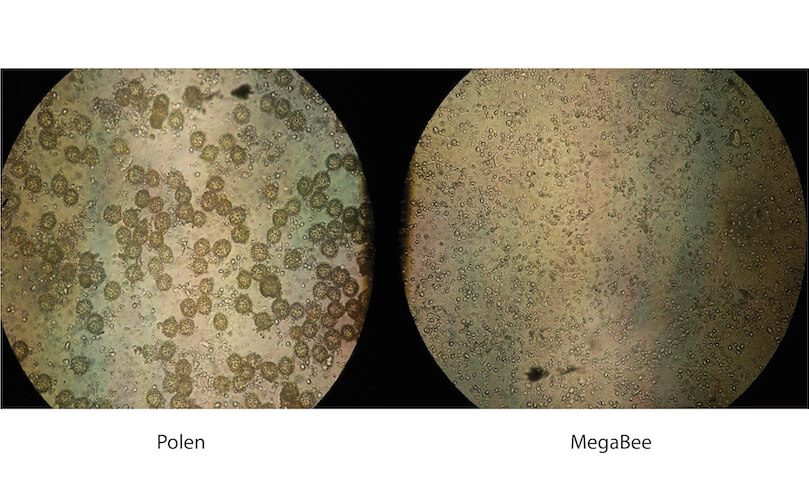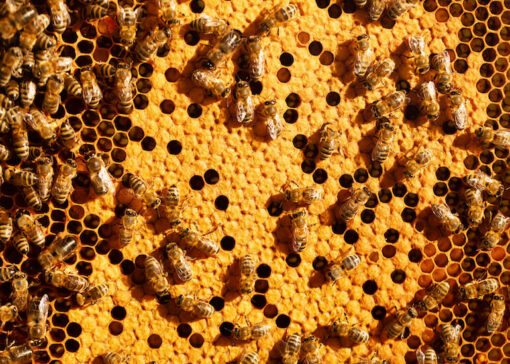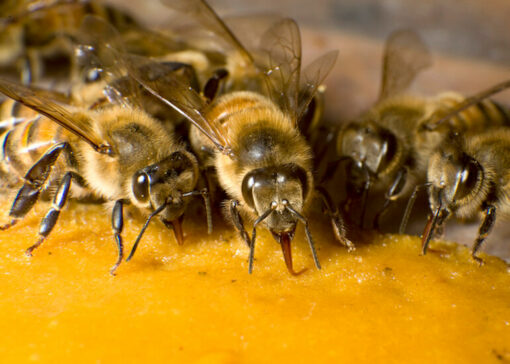The origin of MegaBee
MegaBee is a high-quality protein supplement (46% protein) specifically designed for bees. Developed over several years by Dr. Gordon Wardell, a renowned expert in bee nutrition, MegaBee has become established in the United States and New Zealand as the best pollen substitute. 1 After several years of collaboration with Dr. Wardell, we successfully adapted the formula to make it GMO-free and soy-free.
Give your bees what they truly want
The 5 key benefits of MegaBee:
- Balanced amino acid profile
- Acidic pH for a healthy gut
- Reduced particle size
- Versatile and easy to mix
- Ingredients chosen by bees
MegaBee is manufactured in the European Union, GMO-free, soy-free, and egg-protein-free.
Available in 20 kg or 680 kg bulk bags. 2 kg bags coming soon.
Shelf life: 3 years.


Boost brood production like never before
MegaBee provides the essential proteins, vitamins, lipids, and minerals necessary for optimal brood development. Its scientifically proven benefits include:
- Stimulating the growth and maintenance of hypopharyngeal glands, outperforming even pollen itself! 1-2
- Promoting brood production and colony growth. 1
- Increasing bee longevity by raising protein concentrations in hemolymph.
- Strengthening the bees’ immune system. 2
MegaBee enhances royal jelly production and optimizes hive performance by stimulating the hypopharyngeal glands of nurse bees, thereby increasing protein levels within the colony. 2-3-4
An ideal product for queen and swarm producers!
When it comes to feeding bees, size matters!
Have you ever fed your bees a protein patty only to find much of it ends up at the bottom of the hive? That doesn’t happen with MegaBee.
One of MegaBee’s key advantages is its ability to be quickly absorbed, thanks to its uniquely sized particles.5 Each batch of MegaBee undergoes an intensive grinding process, ensuring rapid breakdown and easy absorption into the bees’ digestive system. It also provides superior solubility when mixed with syrup.
Smaller particles => Maximized nutritional absorption 6


Mix, feed, divide, repeat
When to use MegaBee?
- Early spring: To boost swarms and strengthen hives.
- Autumn: To prepare hives for winter.
- During periods of scarcity: For example, when natural resources are insufficient (drought, low flowering, poor pollen quality) or in response to predation by the yellow-legged hornet.
MegaBee es versátil y puede utilizarse de 3 maneras:
- Mixed with syrup to create a protein patty (recommended use).
- Dissolved in syrup for liquid feeding.
- Directly as a powder.
Follow the “6-Week Rule” to ensure your bees benefit fully from MegaBee!
Testimonials
In my experience, MegaBee is the best commercial protein supplement available on the market today.
Additional Resources on MegaBee

This brochure presents key information about the new “MegaBee” protein supplement for stronger colonies in just a few pages.

MegaBee: a new product to boost the health of your bees
Discover MegaBee, the pollen substitute that improves the health, longevity and nutrition of your bees. Ideal for beekeepers looking for strong, healthy hives.

FAQ
Do you have any questions about MegaBee?
We have prepared 12 questions to help you understand how to use MegaBee and your frequently asked questions.

Practical guide summarizing the usage recommendations for the MegaBee protein supplement: how to use it, when to use it, for how long, etc.

Why use a protein supplement like MegaBee?
Increase the longevity of your bees with MegaBee, the protein supplement that improves hive nutrition and resistance. Ideal for beekeepers in critical periods.

Podcast
Honey Bee Nutrition with Gordon Wardell
Learn about the evolution of beekeeping nutrition over the past 50 years to the critical aspects of honeybee nutrition with an expert.
- Report on the 2022 New Zealand Colony Loss Survey: “MegaBee was the most common type of protein supplement used in 2021/22”
- Gloria DeGrandi-Hoffman, Yanping Chen, Eden Huang, Ming Hua Huang, The effect of diet on protein concentration, hypopharyngeal gland development and virus load in worker honey bees (Apis mellifera L.), Journal of Insect Physiology, Volume 56, Issue 9, 2010, Pages 1184-1191, ISSN 0022-1910, https://doi.org/10.1016/j.jinsphys.2010.03.017.
- MegaBee Study Report, 2007
- Kim, H.; Frunze, O.; Maigoro, A.Y.; Lee, M.-L.; Lee, J.-H.; Kwon, H.-W. Comparative Study of the Effect of Pollen Substitute Diets on Honey Bees during Early Spring. Insects 2024, 15, 101. https://doi.org/10.3390/insects15020101
- Gloria DeGrandi-Hoffman, Gordon Wardell, Fabiana Ahumada-Segura, Thomas Rinderer, Robert Danka & Jeff Pettis (2008) Comparisons of pollen substitute diets for honey bees: consumption rates by colonies and effects on brood and adult populations, Journal of Apicultural Research, 47:4, 265-270, DOI: 10.1080/00218839.2008.11101473
- S.F. Pernal, R.W. Currie, Discrimination and preferences for pollen-based cues by foraging honeybees, Apis mellifera L., Animal Behaviour, Volume 63, Issue 2, 2002, Pages 369-390, ISSN 0003-3472, https://doi.org/10.1006/anbe.2001.1904
MGB-08-EU-N01-01/25
